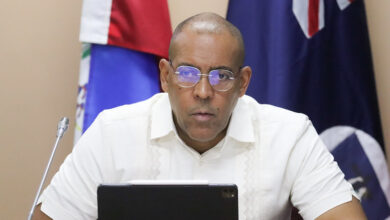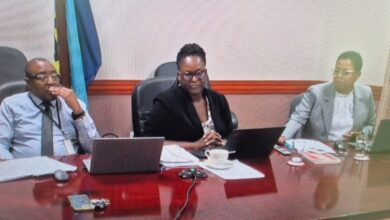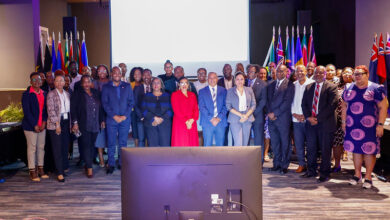It is customary on occasions like these for us to remind ourselves of the times in which we are gathered. This 27th Special Meeting of COTED is being opened here this morning against the background of a global food crisis, precipitated by spiralling commodity prices worldwide, and characterized by Olivier De Schutter, UN Special Rapporteur on the Right to Food, as a “ Silent Tsunami”.
Ladies and Gentlemen:
The fact of the matter is that in the last several months, the world has been witnessing a worrying trend of rapid increasing commodity prices. According to the UN Food and Agriculture Organization (FAO), commodity prices rose sharply in 2006 and continued to rise even more sharply in 2007. The FAO commodity price index rose by nearly 40% in 2007 when compared to 2006, and projections suggest that this trend is likely to continue and intensify.
These frightening increases have been occasioned by production shortfalls, a serious reduction in stock levels of many commodities, an increase in fuel costs, the rising demand of China, and the rapid conversion of agricultural produce into feedstock for bio-fuels.
Not only is food getting more expensive, but it is also becoming increasingly more expensive to produce. The soaring price of fertilizer, one of the major inputs in agricultural production, is a case in point.
These events are in fact summoning us to urgent action, and are once more bringing agriculture to the forefront of international, regional and national agendas. It is for this reason that the UN FAO will be convening a special session in the first week of June to focus on the critical matter of food security. On the 22nd and 23rd of May, that is over the next two days, the UN Human Rights Council will be convening a special session in Geneva to focus on this matter, from the perspective of the serious erosion of people’s right to food brought on by this crisis.
At the regional level, a high level meeting on food security in Latin America and the Caribbean will be convened in Caracas, Venezuela on May 30th by the Latin America and Caribbean Economic System. Not only therefore is our meeting here today opportune and critical, but clearly, based on all that is happening, it is in sync with the regional and international focus.
The matter of food security assumes for us a greater level of poignancy given our reality in the Caribbean of being net food importers. For many of our countries, most of our critical staples are imported and we depend on imports not only to feed ourselves but to feed the millions of visitors that come to our shores. We are particularly vulnerable because over the years, it is a fact that as a region, we have not paid the requisite attention to the agricultural sector, as we ought to. We run a serious risk of undervaluing the role and contribution of the agricultural sector as we look at its contribution solely from the perspective of its share of GDP.
Agriculture is indeed more than food on the table, and provides the basis for a manufacturing sector; it supports tourism, contributes to the transportation sector and is a significant driver of rural development. Taken within this wider context, there is no sector as critical as the agricultural sector, particularly at this point in time.
While it is true that we have been almost exhaustive in our diagnosis of the sector, there is still a significant gap between words and statements of intent on the one hand, and real action on the other hand. The former Agricultural Faculty of the University of the West Indies has been reduced to a Unit within the Faculty of Pure and Applied Sciences. The budget of CARDI, the flagship regional research facility, has not only been constant for the last several years, but so little of it is devoted to real research as against administration, that calls into question the viability of this institution.
Our food health and safety infrastructure is not up to par, seriously constraining our ability to take part in international trade. As is well known, the poor transportation links among our territories render regional trade extremely expensive.
We accept the Jagdeo Initiative as the framework within which these constraints must be addressed. The current food crisis must lend more impetus and urgency to the implementation of the various actions outlined therein. As Ministers of Agriculture, we must be concerned however, that current attempts to address the crisis seem to be focussing more on trade related matters to augment supply of foods from extra regional sources, with not sufficient attention being paid to the urgent matter of building national capacities to produce more food and to produce it efficiently.
While we have a responsibility to provide food in the short term, we must not yield to the temptation of focussing on only trade related matters. It is my hope that this 27th meeting of COTED will accelerate the initiatives already started to address our capacity issues.
Within this context, we must begin urgently to build our research capacity as the driver of agricultural production and productivity. We simply must find better ways and more efficient ways of growing crops and livestock to satisfy our food needs. Jamaica, on behalf of CARICOM, has taken the initiative to conclude an MOU with the Spanish Agency for International Development for the establishment of a Regional Centre of Excellence for Advanced Agricultural technologies at Bodles in Jamaica.
The intention is that this centre will lead the charge in restoring our vastly eroded research capacity and focus on practical research surrounding concrete issues affecting agricultural production, processing and food storage. This centre is expected to facilitate collaboration with various suppliers of inputs, as well as academia, to provide answers and solutions to our regional problems in agriculture. I urge my colleagues here at COTED to buy into this project, as any sustained thrust to deal with food security, must begin with strong research and development.
Soaring commodity prices have now forced many governments to rethink their agricultural strategy. Production plans which were shelved when food was ‘cheap’, are now being dusted off, as the dynamics have shifted to cause such things as the growing of rice, corn, soya and sorghum to become once again feasible. Similarly, in Jamaica, we are seeking to restore our Dairy Industry, which is not only a critical source of protein, but also the sad victim of misguided liberalisation policies in the past.
As we strive to restore production capacity, regional cooperation is going to be important. Therefore, we want to collaborate with Guyana for expertise in the growing of rice in Jamaica. Similarly, in those areas where we possess the skills and competencies, such as fruit tree crops, growing of vegetable, poultry production etc. we are also willing to collaborate.
There is no doubt that some of these production initiatives will require significant capital outlay. Similar capital is required to install critical infrastructure relating to food health and safety, research, irrigation, etc. Within this context, we welcome the donors meeting which was convened last year, and look forward to the investment forum planned for next month.
I am heartened to see all of these critical items being addressed on the agenda, and it is my fervent hope that this 27th meeting of COTED will be a turning point in terms of accelerating action.
Thank You.





